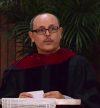Series editor’s note: Throughout 2021, “Deeper understandings” will continue to engage the ELCA’s commitment to authentic diversity. Beverly Wallace will carry on this theme in the next issue. —Kathryn A. Kleinhans, dean of Trinity Lutheran Seminary at Capital University, Columbus, Ohio
Terrazo is a classic Puerto Rican book of short stories written by Abelardo Díaz Alfaro in 1947. In one story, a Puerto Rican teacher tries to teach English to his students. A dialogue between the teacher and his student Tellito goes something like this:
“Read with me. The cock says cock-a-doodle-doo. … Tellito, how does the cock sing in English?”
“I do not know, teacher.”
“But, you have just read it!”
“No,” answered Tellito, looking at the picture.
“Listen, the cock sings cock-a-doodle-doo.”
“Teacher, that’s the American cock. The cock at home sings cocorococó clearly.”
The teacher started to laugh, and then the whole class. Outside, startled by the laughs, Don Ciprian’s cock flaps his wings and sings a clean and metallic cocorococó.
Affirming diversity in our ecclesial landscape does not mean substituting or eliminating anything. It means adding and expanding.
One can read this story as ethnocentric or even with some tension, as two cultures collide in a small and embattled Caribbean island at the beginning of the Cold War. But I think there is more to it—something theological.
The “more” to this story has to do with the incarnation and the way we Lutherans understand the vernacular. “Vernacular” can refer to more than the language commonly spoken in an area. Theologically, vernacular describes the efficacious and meaningful way the Word of God inhabits our human words by the power of the Spirit. It describes Martin Luther’s effort to bring the Bible, preaching and worship to real people in real life.
The “more” in the story of the teacher and Tellito has to do with the real presence of the Word of God among us and the capacity of the Word of God to inhabit the precariousness and limitations of creation. Theologians have captured this idea with the Latin phrase finitum capax infinitum—“the finite is capable of [conveying] the infinite.” The “more” has to do with how we use words as we create reality, as we relate to each other, and even as we understand ourselves with words. It has to do with words as the Word grasps us and establishes a full-of-grace relationship with us.
Adding and expanding
In the incarnation God came to us and the Word became one of us. Jesus assumes our reality and inhabits it as it is. The Word is preached in the vernacular, which is more than simply speaking any language. It is the Word being incarnate in the wholeness and depth of our reality and being. The Word is capable of dwelling in the contingency and precariousness of a small Caribbean island. In Puerto Rico, it means that the cock sings cocorococó.
God finds a way to be present and understand Tellito as he listens to the cock singing in Spanish—not as ethnocentric but as a contextual and profoundly theological reality. God listens and speaks to us en español. Theology and biography go hand in hand.
Affirming diversity in our ecclesial landscape does not mean substituting or eliminating anything. It means adding and expanding. It means that we need to deepen our landscape of theological education to include Tellito.
Our theological education system will only grow and strengthen as new eyes and new voices … find connections, relationships, nuances and language that help us better grasp and articulate our faith.
Our theological education system will only grow and strengthen as new eyes and new voices read and comment on our confessional tradition and find connections, relationships, nuances and language that help us better grasp and articulate our faith. This is true of all ethnic-specific communities and all accents present in our denomination.
The true aggregate of vernaculars—a melody of methodologies, hermeneutics and theological lenses incorporated in our denominational system of theological education—will only help us to better explain and share what we believe and confess.
This aggregate, which includes the cocorococó, is precisely what theologian Justo L. González identifies in his book Out of Every Tribe and Nation: Christian Theology at the Ethnic Roundtable (Abingdon Press, 1992) as “according to the whole” or the “catholicity” (universality) of the church: “the openness for the testimony of plural perspectives and experiences, which is implied in the fourfold canonical witness of the gospel.”
Because the Word became flesh and lived among us, and we have seen his glory, the glory as of a father’s only son, full of grace and truth (John 1:14).





